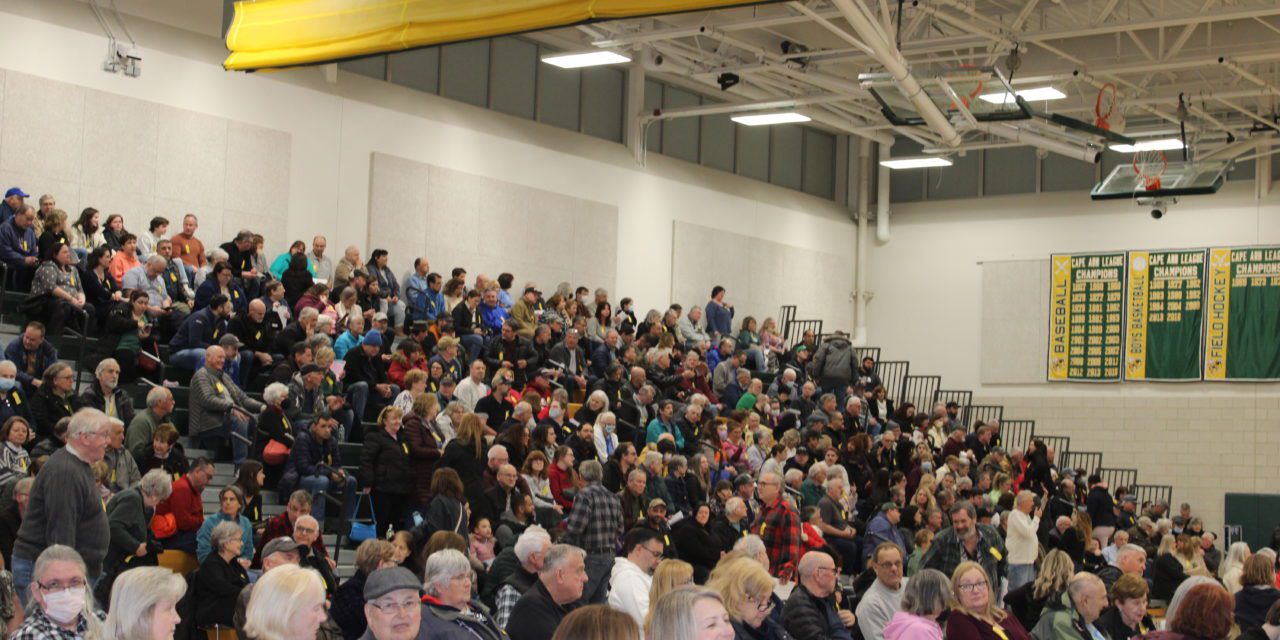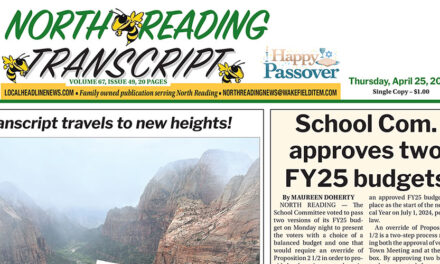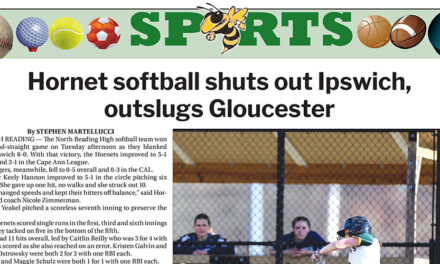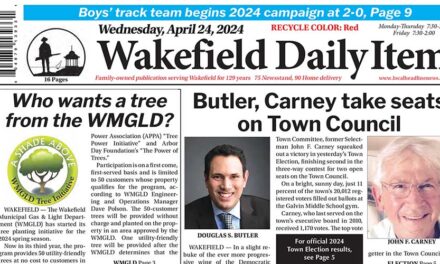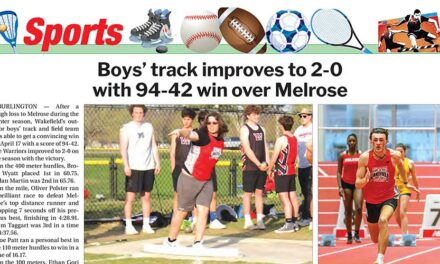A CROWD of 713 registered voters attended Monday night’s Special Town Meeting, packing the bleachers and the floor of the high school gymnasium. It was one of the largest turnouts for a Town Meeting in the past decade. (Maureen Doherty Photo)
By MAUREEN DOHERTY
NORTH READING — The overwhelming majority of the 713 attendees at Monday’s Special Town Meeting voted to restore the original language of what is commonly referred to as the town’s “betterment bylaw” by a voice vote.
One of the largest Town Meetings to be held in several years was initiated by a Citizens’ Petition sponsored by Adam Austin, 42 Main St., Unit 4, and supported in a signature-gathering campaign of 345 certified registered voters in town.
This petition asked the voters of the town to amend the Code of North Reading General By-Laws Chapter 25 – Assessments, by essentially restoring the language back to the way it was prior to being amended by voters at the June 2022 Annual Town Meeting.
Under the original bylaw language, a betterment assessment was locked in at a 50/50 split between direct abutters and all the town’s taxpayers. The amendment backed by the voters last June and approved by the Attorney General last October gave the town the ability to propose that direct abutters take on a greater or lesser share of a betterment cost, with the balance spread out among the tax base not directly benefitting from a project.
This flexibility was necessary, according to the Select Board and other town officials at the time, to make such large projects mathematically feasible. When the bylaw change was proposed last June, for instance, the final cost estimate to build the wastewater system infrastructure connecting sections of the town to the Greater Lawrence Sanitary District in North Andover was not yet known. Those calculations were being ascertained last summer by the town’s consultants. The cost estimate of $130,000,000 was announced last fall during the series of public information gathering workshops held by the Department of Public Works and the Select Board.
The direct abutters to the project are those properties on Main Street (Rte. 28); Park Street West (west of Main Street to Concord Street); all of Concord Street; North Street (from Main Street to Lowell Road/Rte. 62); and Lowell Road/Rte. 62 (from North Street to the Wilmington town line). The impact on the 60+ single family homes and the nearly 1,000 condominium units was deemed to be too onerous, especially based on a proposal that compelled abutters to tie into the system and the fact that a lien would be placed on their property for a financing period of 20 to 30 years until it was paid off.
Based on the feedback, it became obvious by early November that neither the abutters nor many non-abutters supported the burdensome costs being proposed for the abutters. As Select Board member Stephen O’Leary pointed out Monday night, over 700 people had provided feedback to them, either in person or by email. Based on this feedback, they went back to the drawing board and by mid-February a new plan evolved with different funding mechanisms that do not include betterments but do offer an opt-in process. But O’Leary also emphasized that under any scenario offered the decision is ultimately up to Town Meeting, not the Select Board. While the board or the DPW or their consultants can make recommendations, it’s the voters at an open Town Meeting who have the power to say yay or nay. And since borrowing of funds will be required, no project would pass by a simple majority; it would have to be at least a two-thirds majority followed by a townwide debt exclusion override vote of Proposition 2 1/2 in order to pass.
Public information forums are currently being held to collect more feedback from the public on the latest proposal. One session was held last night (March 8), another was held March 2 with several other town boards, and the next session will be held virtually on Wednesday, April 5 followed by another in-person session on Wednesday, April 12.
The timing of the project also matters, the voters learned, because MassDOT is currently in the process of planning major roadway projects along the route in the vicinity of Rte. 125 so if the town piggybacks onto that timeline the project could take place while the roadway was opened up. But once the state completes major infrastructure work on any state highway it would not approve having it torn up to accommodate the infrastructure North Reading would need to pass through along its way to the GLSD for a number of years, which would increase the cost of the project overall.
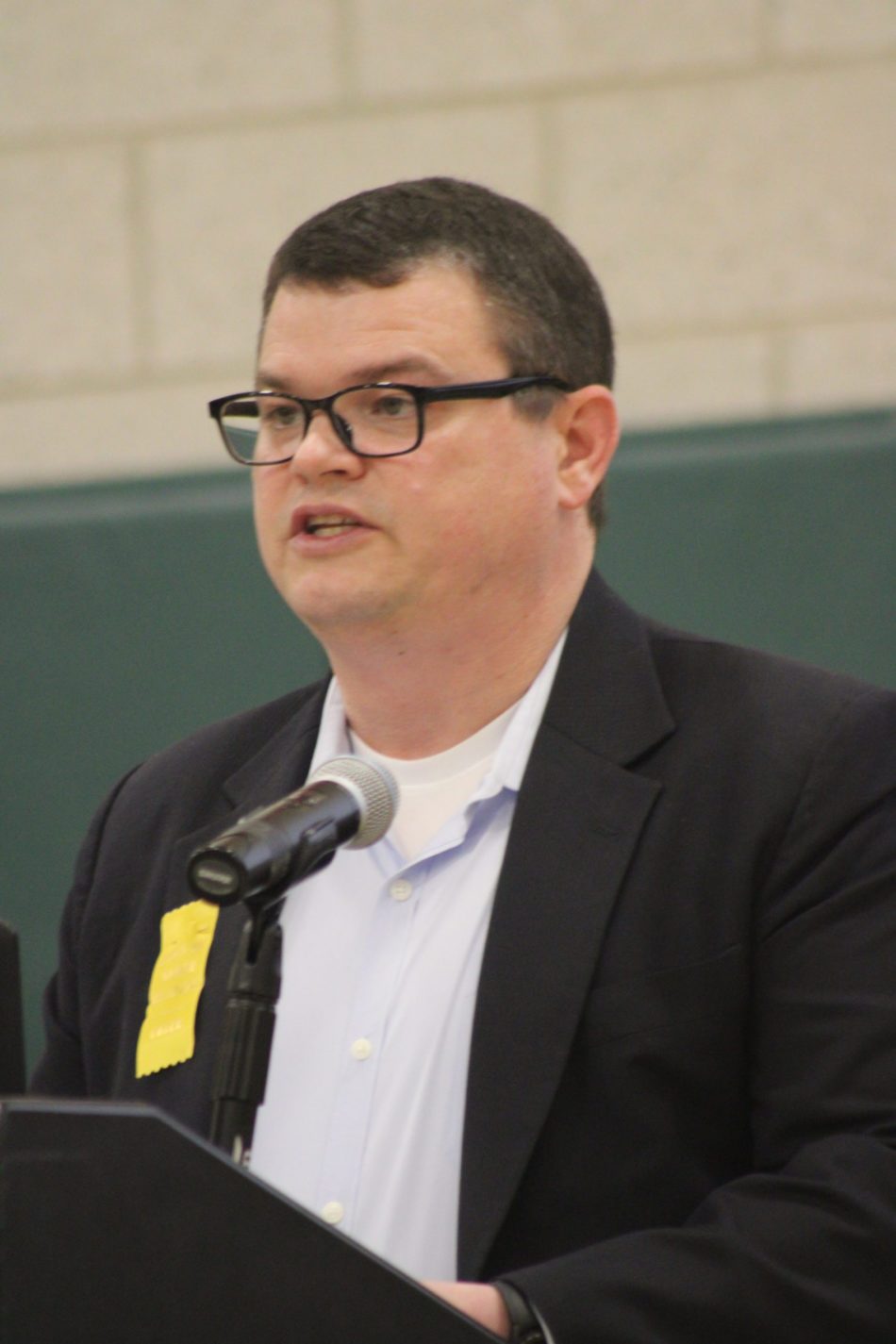
ADAM AUSTIN
Town Meeting action
At the outset of the Town Meeting, resident Pat Fillmore requested the petition sponsor, Adam Austin, give a presentation prior to a general discussion. Town Moderator John Murphy offered Austin five minutes to read his statement. “As we have seen over the last few weeks, there are options to fund infrastructure projects that do not include the assessment of betterments. Tonight’s vote would only impact proposals that include betterments on sewer projects,” Austin explained. “This bylaw, in its entirety, covers several types of projects, but the only type of project that will be affected by this proposed change are sewer projects. Before June of 2022, the bylaw handled sewer projects the same way as water projects, but after the change, sewer projects are broken out in the bylaw to be handled differently. Tonight’s vote is to change the bylaw back to the exact wording that was in place before the change in June of 2022, and to reestablish the protections that apply to abutters of any other type of infrastructure projects in our town to the abutters of sewer projects.”
Austin also stressed the need to restore the ability of the direct abutters to have the power of approving or disapproving a project before it gets to the Town Meeting stage. “Prior to the June of 2022 bylaw change, if a sewer infrastructure project was proposed, the group of abutters had to hold a vote. For a betterment to be assessed, a majority of abutters (both by count, and by water flow of the proposed project) had to vote to accept the betterment. This was to ensure that the project was prudent and a good value for money in order for the town to be able to place liens on abutter’s properties. Then, the whole town would vote at Town Meeting to see if all members of the town would agree to fund the remainder of the project,” Austin said. “If abutters agreed to the betterment assessment, and Town Meeting agreed to pay the remaining balance from the General Fund the project could move forward. If the amount of money to be paid by the General Fund required a 2 1/2 override, a Special Town Election would be held to approve the override.”
Austin continued, “After the change in June of 2022, the Town Meeting vote and Special Election requirements remain the same, but the vote for abutters was stripped from the bylaw. It was an important protection for abutters, and we need to take action to reestablish it. The change in the bylaw is not just about the removal of the abutters’ vote, but also about how the costs of sewer infrastructure projects are divided. Before the change, the costs were split between the abutters and the town’s General Fund, with the General Fund covering at least 50% of the cost. However, after the change, the Select Board has the power to divide the costs as they see fit. Last fall, we saw an example of a proposal that could not have been made before the bylaw was changed. Immediately after the change, the Select Board proposed that abutters pay 53% of a $130,000,000 project, and General Fund cover the remaining 47%, whether or not abutters ever connected to the new infrastructure, and without an abutter’s vote to approve the betterment.”
Austin said the bylaw change last June only affected sewer infrastructure, not other types of infrastructure such as water. “So why is it important to restore the abutters’ vote?” he asked. “First and foremost, it’s about protecting the rights and financial well-being of all residents of North Reading. By ensuring that abutters have a say in whether or not a betterment can be assessed on their properties, we are ensuring that they have a voice in decisions that can have a significant impact on their finances and quality of life. Abutters should have a say in whether or not they want to take on the financial burden of the project above and beyond the burden placed on each and every taxpayer of the town.”
“In addition, restoring the abutters’ vote helps to ensure that a proposed project is supported by the community as a whole. When the abutters have a say in the matter, more reasonable proposals must be made. This means that abutters are more likely to support a proposed project, which can lead to greater community buy-in and cooperation. This, in turn, can lead to a more successful and efficient project,” Austin said, adding, “In conclusion, the upcoming vote on amending the betterment bylaw is a crucial issue for all residents of North Reading. By restoring the abutters’ vote, we can protect the rights and financial well-being of our residents, promote community buy-in and cooperation, and ensure transparency and accountability in our local government.” He was offered a hearty round of applause from the voters.
In regard to the removal of the betterment voting in the revised bylaw, O’Leary explained that such neighborhood by neighborhood voting could derail a project of value to the community. “If Concord Street says yes, Park Street says no, Main Street says yes, North Street says no, Lowell Road says yes, we can’t effectively finance a project so a project that would be in the best interest of the community as a whole cannot more forward because of this impediment,” O’Leary said.
Former Select Board member Andrew Schultz of Central Street, who added that he is technically an abutter because he owns a commercial condo at Park Place which is along the route, spoke in support of the work done by the Select Board on this proposal even though he did not agree with the financial numbers proposed last fall.
“Whether this vote passes or fails I do not think is going to affect whether North Reading has sewer because I believe the Select Board now is looking for alternatives that do not include a betterment, and that is something I support. I did not support the original numbers that came out. It was too high for the people along the route,” Schultz said. “These people on all these boards are volunteers. I can’t tell you how many hours per week I put in when I was on the board, probably 15 to 20 hours per week, and you can disagree with somebody’s politics, their position, but when I see some of the vitriol going after people personally on social media, it hurts me… No one is trying to do a backroom deal. No one is trying to split the people in the town… we’re all residents of the town and I just wish some of the social media could tone it down a bit. I am with you on the numbers but I am not with you on some of the attacks on these people. I just don’t think that’s right.” The crown applauded his comments.
After several additional speakers a resident rose to “move the question” which passed overwhelmingly on a voice vote and some confusion followed as people began to head for the exits, believe that they have voted on the amendment. Prior to a vote to adjourn, Amy DiChiara rose to the mic to state that a vote on the main motion had not been taken. After a brief discussion with the moderator, Murphy once again called for vote on the main motion and the response was equally in favor with a few nays. He then called for the meeting to adjourn.
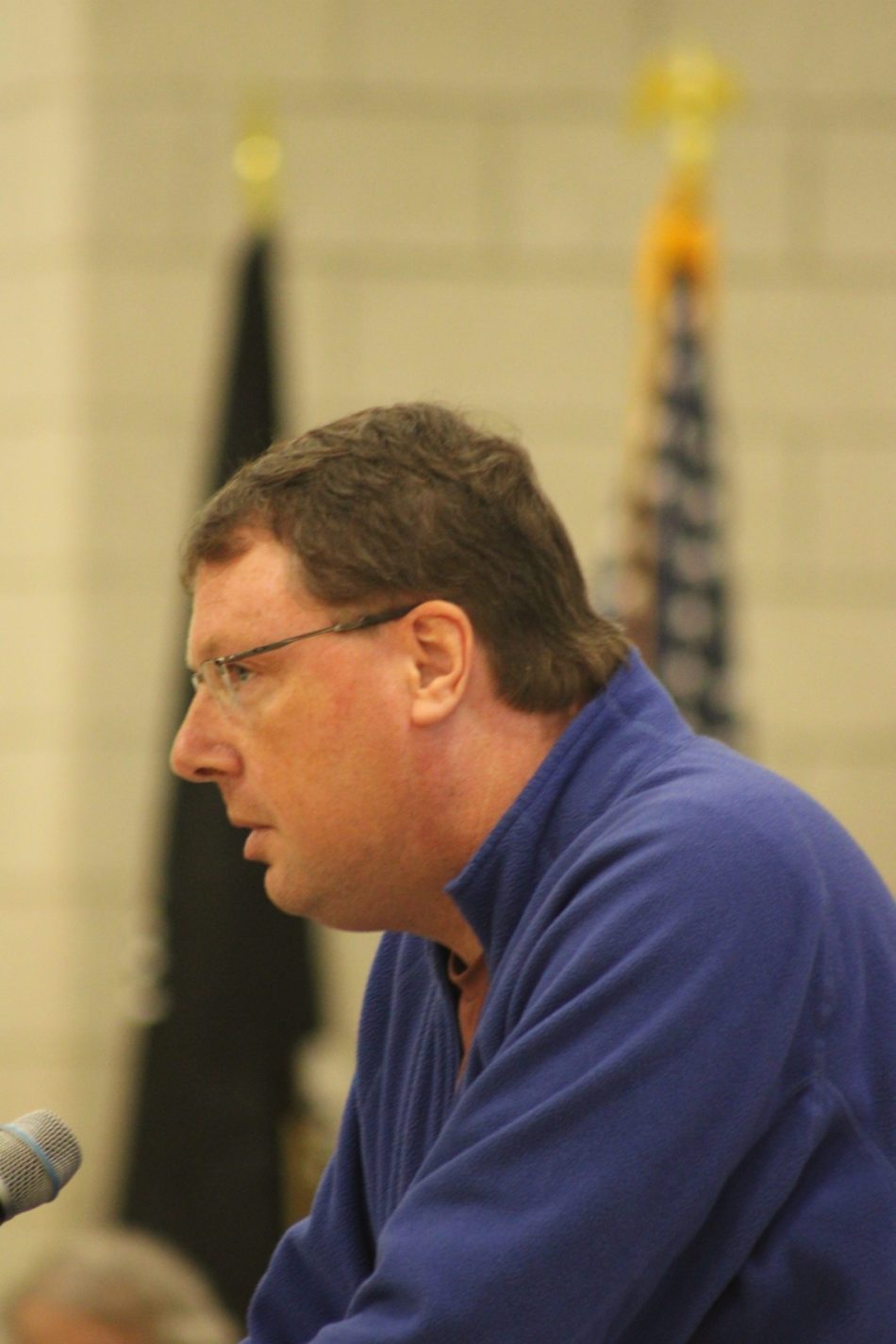
ANDREW SCHULTZ
On Tuesday, the following statement was issued clarifying what had transpired:
Town Moderator John Murphy, Town Clerk Susan Duplin and Town Administrator Michael Gilleberto issued the following statement on Tuesday afternoon to clarify any confusion regarding the vote taken to overturn Chapter 25 – Assessments of the Code of North Reading at the Special Town Meeting Monday night:
“We are grateful to the 713 registered voters, and others, who attended (Monday) night’s Special Town Meeting to consider a Citizens’ Petition to amend Chapter 25 – Assessments of the Code of North Reading. This was one of the largest Town Meetings since 2013.
“As the attendees know, there was confusion within the room at the end of the meeting. Debate was occurring on a motion to approve the Citizens’ Petition article, and a motion was made to “move the question.” The motion to “move the question” was approved on a voice vote. Attendees began to leave the meeting and a motion to adjourn was offered at 8:10 p.m. but not voted upon. A point of order was then raised that the motion to approve the Citizens’ Petition had not been voted upon. A further point of order was raised that the motion to approve the Citizens’ Petition required a second, and a second was offered, however a second is not generally offered or required at North Reading Town Meeting.
“A vote was taken on the motion to approve the Citizens’ Petition article and it carried on a voice vote. The Town Moderator then declared Town Meeting adjourned and attendees left the room at 8:12 p.m.
“We have conferred with Town Counsel and while a voice vote is generally taken on a motion to adjourn, pursuant to general principles of parliamentary law the Moderator may declare the meeting adjourned when the business is concluded and it is apparent from the actions of those present that there is unanimous consent.
“(Monday) night, upon the Moderator’s declaration that the meeting was adjourned, attendees filed out of the room, and the Special Town Meeting was adjourned sine die (officially closed without providing a further date).
“The Town Clerk will submit the approved bylaw to the Attorney General as required under state law. The Attorney General has 90 days to approve or disapprove of the bylaw, and the Town Clerk will publish notice of the Attorney General’s actions upon receipt.”

